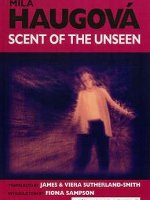
Scent of the unseen
Arc Publications, Todmorden, 2003.
Translated by James and Viera Sutherland-Smith.
Introduction by Fiona Sampson.
In this bilingual edition the mature work of one of Slovakia’s leading poets is presented to English-speaking readers, with a useful introduction by Fiona Sampson.
Already there’s nothing that I wouldn’t want to hide, I’m putting
down roots in a world
in which
there’s little space for me ...
(The complexion of the forest)
– these lines seem to capture the spirit of the poems as a whole. Mila Haugová is elusive, restless, birdlike. Abandoning particular time and place, she follows the tracks of a primordial woman-figure. Alfa, as she is called in certain poems, is keenly aware of the animal within her. Birds, reptiles, plants, stones, fire, fascinate her. She can go so far as to dream of vegetating:
I would like a world without words. To stifle
cold and savage ideas: to lie on
on the earth and listen to everything.
(Vegetable diaries)
But this word-weariness is a rare mood. The primordial woman is a poet, or she desperately wants to be, competing as she does for psychic space with primordial man. One finds her musing, often dreaming, sometimes reminiscing, now and then philosophising. She will swoop on metaphysical questions, or even social questions:
The forest in which mother and father have remained is not
real. It irritates with a painted movement in the dusk,
colours running down the tree trunks. Which
am I leaning against? ...
(Alfa carries her hiding place within her)
God is an obscure but, apparently, real presence in these poems. The sense of mortality is constant. A high point of the collection is 29.11.1995, an exquisite short poem about death.
This is poetry moving warily in the deep shadows of pessimism. But even those who need a different kind of poetry can acknowledge that it is well done, much better than anything similar in the English-speaking lands. Only in the final sequence, From an atlas of sand, does one strike a blank wall. The material here is so fragmented and arbitrary – like “notes from a talking-cure”, as Fiona Sampson says – that for most readers the opening lines will sound like mockery:
between you and me however near one another we are
the word is always somewhere between.
The translation aims at a faithful mapping of the difficult Slovak original in idiomatic English. By and large it seems successful, showing the power and capaciousness of the English language once again. English, however, is much more powerful than graceful; 29.11.1995, for example, has a gracefulness that is lost in transit. Though accurate overall, the English version has lapses. Key words are sometimes ignored and two lines are omitted from Aletheia, turning the mystic flight of that obscure poem into comedy. Occasional phrases are misconstrued, e.g. Ničím neukotvené v zmysloch (Dvojnosť) cannot be “Unanchored in my senses I destroy” –which anyhow ruins the movement of thought – but refers to a word “not anchored by anything in the senses. ”